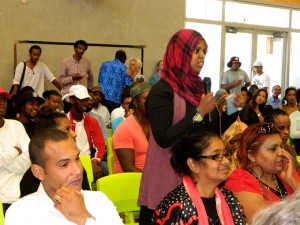AsiaPacificReport.nz
By Anna Majavu
Prominent Auckland academics and community leaders have called on the New Zealand police to formally apologise for “rubbishing” new research alleging that police are racially harassing and assaulting African youth.
The two-year research project was led by Auckland University of Technology associate professor in social sciences, Dr Camille Nakhid.
Last week, New Zealand police issued a press statement claiming that the research was nothing more than “unsubstantiated claims from anonymised individuals” made online.
Yesterday, at the official launch of the research in Mount Roskill, Auckland, about 400 people called on the police to acknowledge that the research was credible and legitimate.
AUT associate professor of public policy, Love Chile, said the police had been “completely dismissive”.
“This research went through a stringent ethics approval. We are demanding an apology”, said Dr Chile.
Dr Chile called on police to issue everyone they stopped with a leaflet advising them of their human rights, similar to those displayed in hospitals.
‘Tip of the iceberg’
“The issue of racism within the police is fundamental. We may deny it but what we are seeing in this report is only the tip of the iceberg. Insidious racism has to be addressed” said Dr Chile.
Noah Ghebremichael, vice-president of the African Communities Forum Inc. (Acofi), also called on the police to retract their claims that the research was unsubstantiated.

Presenting the report, co-researcher Kizito Essuman said it was very unfair that the positive relationship African youth organisations had tried to foster with the police did not seem to positively influence the culture of policing on the streets.
Dr Nakhid emphasised that the alleged police abuses were not isolated incidents.
“It is not one or two police. It is a police culture” said Dr Nakhid.
The police abuses of African youth had far reaching effects – the African community in general did not trust the police and so even when they were victims of crime, they did not always call the police, Dr Nakhid said.
Māori activists at the meeting welcomed the new research, pointing out that Māori were the original victims of police racism.
‘Country based on racism’
“This country is based on racism. If you stand up now, maybe you can stop the mass incarceration of African youth” said one speaker.
The police have said they will not take action based on the research unless individual participants (whose identities were protected in the report) come forward and lay complaints.
This was rejected by the audience at the meeting with one speaker saying that the Independent Police Conduct Authority of New Zealand was not “independent” at all, but was “80 percent police investigating police”.
Dr Nakhid said instead of arguing about why African youth did not come to police after being abused by other police, the police could solve the problem by ending their mistreatment of African youth.
Members of the audience also rejected the notion that the arrests and alleged abuses of African youth may have come about because of “unconscious bias” on the part of the police.
With “prisons full of Māori and Pacific Islanders, that is a bit more than unconscious bias” said criminologist Dr John Buttle of AUT, while another speaker said Muslim youth were also racially profiled by the police.
The police, represented at the meeting by Senior Sergeant Joe Tipene, the police Māori Responsiveness Adviser, would not commit to apologising for their dismissal of the report and maintained that “the full details of everything that has been said” should be brought to them.
Anna Majavu is an independent journalist and a former contributing editor on the Pacific Media Centre’s Pacific Media Watch freedom project.
Photo gallery at the forum by Del Abcede
–]]>




